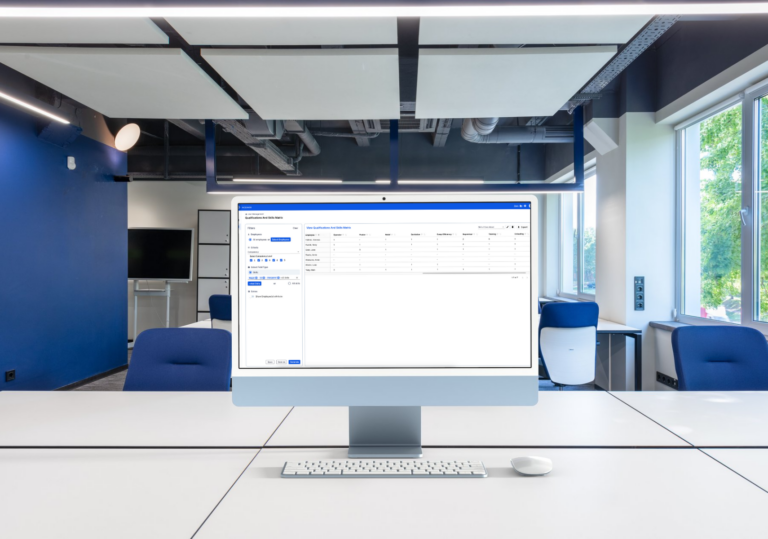According to a 2023 article by Reuters, the average gap between the number of monthly job openings and hires in the U.S. manufacturing sector exceeded 400,000 in early 2022, highlighting the critical need for better qualification management and complex scheduling systems.
Due to strict regulations and complex scheduling procedures, there is a great opportunity for 24×7 environments like manufacturing and transportation to leverage a Qualification Management System (QMS)—and it all begins with how employees’ skills and certifications can be utilized during the scheduling process.
What is a Qualification Management System (QMS)?
At first glance, a Qualification Management System (QMS) has pretty straightforward capabilities: it manages your employees’ qualifications. But a QMS can be leveraged as much more than just a record-keeping software.
Beyond storing employee qualifications, a QMS can automate key processes such as certification renewal alerts, compliance tracking, and skills gap analysis. This means organizations can proactively manage workforce readiness and avoid costly penalties due to expired or missing qualifications.
Key features of an advanced QMS include:
-
Centralized, digital storage of qualifications and training records accessible in real-time
-
Automated notifications for expiring certifications and mandatory training deadlines
-
Seamless integration with workforce scheduling to match employee skills with job requirements
-
Comprehensive audit trails to maintain regulatory compliance and simplify inspections
By integrating with scheduling systems, a QMS ensures that only qualified personnel are scheduled for critical tasks, reducing risk and boosting overall productivity. Together, these capabilities transform a QMS from a simple database into a powerful workforce optimization platform.
Benefits of Qualification Management for Complex Scheduling
1. Maximize Your Employees
Are you assigning employees to positions where they are a good fit, or do you find yourself scrambling to get just about anyone on the line so production isn’t halted?
Your employees work best when their unique skill sets are leveraged. Having the certifications of your employees already attributed to them during the scheduling phase makes this easier to achieve. Of course, schedulers already know this. But how many schedulers can say that qualification mapping happens in just a few minutes?
Without the right qualification management system, this is what your schedulers go through to match employee certifications with scheduling needs: Every week, they go to HR and request employee records; these records are usually on paper and may be completely out-of-date. While creating the week’s shift roster, the scheduler needs to sift through piles of paper containing the certifications and past hours worked for each employee to find the most optimal employees who are available. This plug-and-play approach can take hours… and that’s before someone calls in sick or complains that they had already been approved for a vacation that week.
Now, how does creating a week-long schedule look with a QMS?
For starters, schedulers can ensure that they assign the most qualified workers to each position at the click of a button. They can search and identify the most optimal employees for the shift based on specific skills certification; they can also receive automatic renewal notifications based on expirations or date last worked, so they never assign an unqualified person to a position. Much more streamlined than the previous scenario, right?
2. Keep a Centralized System of Record
Eliminate the need for scattered systems and paper-based processes by having leave request, scheduling, and qualification information for each employee all in one place. With everything in the cloud, valuable employee information won’t get misplaced (or thrown away).
Paper has a plethora of issues. For one, it creates messy piles, allowing for random sheets to get lost; to add to the confusion, paper doesn’t allow you to run audit logs or show a dynamic report, so you always have to rely on a static document with messy edits and scribbles. For another, records updated on paper means that an unlucky someone has to go through the pile and create a master list. Think of all the human error risks, from accidentally writing down the wrong number to dealing with illegible penmanship.
Let’s say your facility is a bit more advanced and you store information digitally. There are still access issues (passwords, firewalls, etc.) that bar everyone from having visibility. And even if all the right people have access to the information, the digital list needs to be pulled and viewed on another screen—or a printed-out piece of paper—so that the scheduler can compare that list with the roster.
Having your employee qualification data centralized in the cloud is not just tables takes for internal audits, but also for keeping compliant with your complex union, federal, state, and fatigue rules. Speaking of…
3. Remain Compliant—Consistently
All these complex rules can be so hard to manage when dealing with paper, spreadsheets, and other outdated processes.
Do you have a system of record for something as specific as validity periods on qualifications? If you don’t have a QMS integration, the answer is ‘no’. And in today’s increasingly complex regulatory environment, not having ways to easily audit an employee’s every keystroke and movement is going to expose your organization to risk.
Let’s use food processing as an example. This industry is now more than ever holding facilities accountable for better skills auditing, and all large facilities need to have their food safety documentation written (and easily accessible) by July. Such compulsory FDA measures enhance the need to upgrade workforce management technologies to keep your information centralized—especially qualification tracking.
Avoid costly compliance penalties and employee downtime by ensuring that employees remain certified and eligible for work.
Unlock Workforce Efficiency with Indeavor
To reach your business goals, you need to have the right person, in the right place, at the right time. Our easily-integrated QMS automatically assigns employees based on a skills matrix while automatically generating your schedule.
Click here to request a demo.




